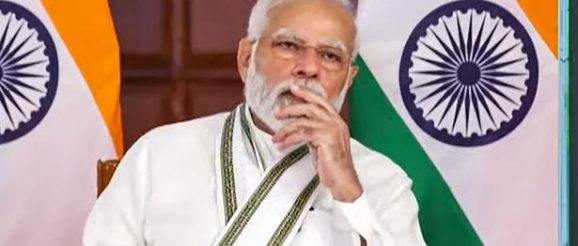PM Modi calls for concerted efforts to make India global centre of research and innovation – The Hindu BusinessLine

Prime Minister Narendra Modi on Saturday called for concerted efforts to make India a global centre of research and innovation, and urged state governments to frame modern policies in the fields of science and technology.
Modi lamented that unlike the western countries, India failed to adequately celebrate the works of its scientists, which turned a large section of the society indifferent towards science.
There is a need to celebrate the achievements of Indian scientists, he said.
‘ Rise in investments in S&T’
Addressing via video link the inaugural session of the Centre-State Science Conclave organised here, Modi said that since 2014, there has been a significant rise in investment in the fields of science and technology.
India is going ahead with the mantra of ‘Jai Jawan, Jai Kisan, Jai Vigyan and Jai Anusandhan’ (Hail soldiers, farmers, science and research), he said.
“We have to work together on various fronts to make India a global centre of research and innovation in this ‘amrit kaal’. We have to take our research in the fields of science and technology to the local level. It is the need of the hour for all the states to lay emphasis on innovation to find local solutions to local problems,” he said.
Urging the state governments to frame modern policies related to science, innovation and technology to find solutions to local problems, he stressed the need for more cooperation and collaboration with scientists.
“In order to encourage innovation, the state governments should give emphasis on creation of more and ore scientific institutions and on simplification of processes. The number of innovation labs should also be increased in the institutions of higher education in states,” he said.
‘Localised solutions needed’
Modi said India’s Global Innovation Index ranking improved from 81 in 2015 to 46 due to the efforts of the central government.
There is a need to find localised solutions to issues like affordable housing, climate-resilient crops and waste recycling, he said.
“It is important that to deal with all these challenges, every state should frame modern policies related to science, innovation and technology and implement them. As governments, we should cooperate and collaborate more and more with our scientists. This will help create an environment of scientific modernity in the country,” he said.
He also called for “optimum utilisation” of scientific institutions in the states.
“There are many national-level scientific institutes and laboratories in states. So the states should take full advantage of their ability and expertise. We also have to take our science-related institutions out of silos,” he said.
He pointed out how unlike the West, India failed to celebrate the works of our scientists in the early decades of the last century as much as was required, which led to an emergence of feeling of indifference towards science among a large section of our society.
“When we celebrate the achievements of our scientists, science becomes a natural part of our society, it becomes part of culture. Therefore, today my first request is that we celebrate the achievements of the scientists of our country with great enthusiasm,” he said.
“Today in every area, Indian scientists are working wonders. The inclination towards science created by celebrating every small and big achievements of Indians scientists will help us in our ‘amrit kaal’,” he added.
Modi said his government is moving forward with the idea of science-based development. Since 2014, there has been a significant increase in investment in the field of science and technology, he said.
The record number of patents, innovations and emergence of startups show how fast things were changing in the country, he said.
“There is inclination for science, technology and innovation in the DNA of today’s generation. They adopt technology very fast. We have to support this young generation with all our might. In India, new sectors are being created, opening up for the young generation today,” he said.
“Whether it is a space mission, deep ocean mission, national supercomputing mission, semiconductor mission, hydrogen mission, drone technology…works are moving fast on many such missions,” he said.
Modi said emphasis is placed on offering lessons in science and technology in a student’s mother tongue.
He also talked about “hyper specialisation”, and said that the Centre is ready to help states in the development of global-level specialised laboratories.
“You should also work for the increase in programmes in your states, which helps take science and technology at the grassroot level,” he said, adding that states should encourage more schools to participate in science festivals and pay close attention to the science curriculum of other states.
“Whatever is good in other states can be replicated in your state. Development of infrastructure related to science and technology in every state is equally important to encourage science in the country,” he said.
Modi said that when India is moving towards leading the fourth industrial revolution, the role of science and people associated with this field is very important.
For research and innovation ecosystem to become the best in the world, India will have to work with all honesty in the ‘amrit kaal’, the PM said.
Gujarat Chief Minister Bhupendra Patel and Union Minister of State for Science and Technology Jitendra Singh were also present at the inaugural meet. Science and Technology ministers and secretaries of states and union territories, industry leaders, entrepreneurs, NGOs, young scientists and students will participate in the event.
The conclave includes sessions on different thematic areas like STI Vision 2047; Future Growth Pathways and Vision for STI in states; Health – Digital Health Care for All; Doubling Private Sector investment in R&D by 2030; Agriculture – Technological interventions for improving farmers’ income, etc.
September 10, 2022

or using abbreviated text. (example: u cannot substitute for you, d is not ‘the’, n is not ‘and’).